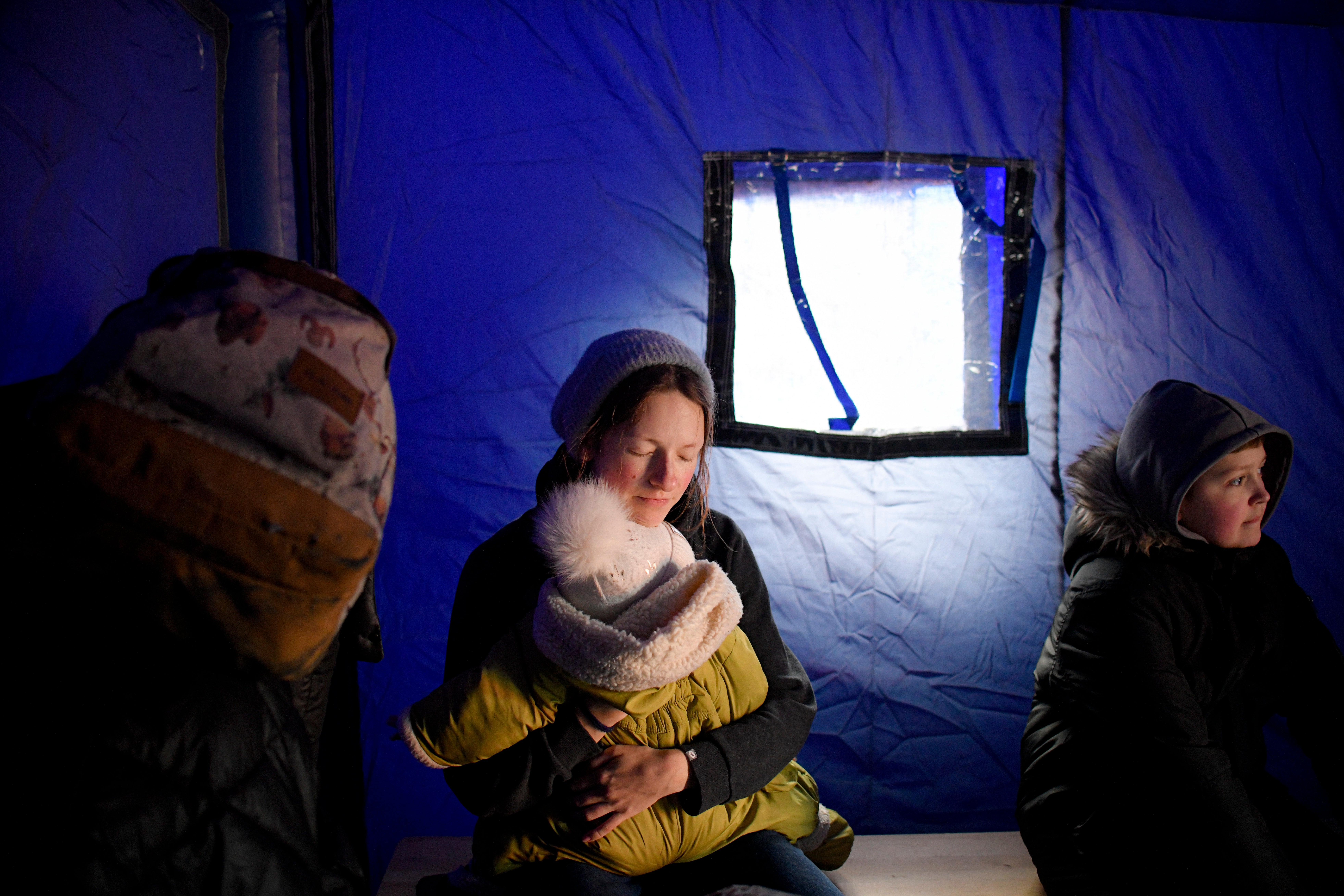Ukraine's most vulnerable among those fleeing Russia's war
Some of the nearly 1 million people who have fled Russia’s devastating war in Ukraine in recent days count among society’s most vulnerable

Your support helps us to tell the story
From reproductive rights to climate change to Big Tech, The Independent is on the ground when the story is developing. Whether it's investigating the financials of Elon Musk's pro-Trump PAC or producing our latest documentary, 'The A Word', which shines a light on the American women fighting for reproductive rights, we know how important it is to parse out the facts from the messaging.
At such a critical moment in US history, we need reporters on the ground. Your donation allows us to keep sending journalists to speak to both sides of the story.
The Independent is trusted by Americans across the entire political spectrum. And unlike many other quality news outlets, we choose not to lock Americans out of our reporting and analysis with paywalls. We believe quality journalism should be available to everyone, paid for by those who can afford it.
Your support makes all the difference.Some of the nearly 1 million people who have fled Russia's devastating war in Ukraine in recent days count among society's most vulnerable, unable to make the decision on their own to flee and requiring careful assistance to make the journey to safety.
At the train station in the Hungarian town of Zahony on Wednesday, more than 200 young Ukrainians with disabilities — residents of two orphanages in Ukraine’s capital of Kyiv — disembarked into the cold wind of the train platform after an arduous escape from the violence gripping Ukraine.
The refugees, most of them children with mental and physical disabilities, were evacuated from their care facilities once the Russian assault on the capital intensified.
“It wasn't safe to stay there, there were rockets, they were shooting at Kyiv,” said Larissa Leonidovna, the director of the Svyatoshinksy orphanage in Kyiv. “We spent more than an hour underground during a bombing.”
Russia's intensifying attack on Ukraine has forced hundreds of thousands to leave the country in the last six days in what one U.N. official predicted could become Europe's “biggest refugee crisis this century.”
The U.N. refugee agency says more than 874,000 people have fled Ukraine since Russia’s invasion last week and the figure is “rising exponentially,” putting it on track to cross the 1 million mark on Wednesday.
While many of those fleeing are able-bodied adults, choosing to brave long and sometimes dangerous journeys to bring themselves and their families to safety, others are at the mercy of their caregivers to deliver them out of danger.
“These children need a lot of attention, they have illnesses and require special care,” said Leonidovna, the director of the Kyiv orphanage.
Moving from the train in groups of 30, the children — also from the Darnytskyy orphanage in Kyiv — were escorted to buses waiting to take them to Opole, Poland, where they would be settled and receive further care.
“There are 216 people altogether, the children along with their chaperones,” said Viktoria Mikolayivna, deputy director of the Darnytskyy home.
Cold weather gripping Eastern Europe on Wednesday made conditions even harder for those fleeing.
At the border area of Palanca in southern Moldova, a country that shares a long border with Ukraine, temperatures hovered around freezing and a fresh blanket of snow covered the ground.
Mothers with young children came wrapped in blankets and clothing, but the cold weather has made an already desperate situation even worse.
Julia, a 32-year-old mother with a 3-year-old child, tried to calm her son who was burning with fever. She felt helpless, she said, but is proud that she made the decision to help her family.
“Thank God that I can protect my family, but I didn’t want to leave my country. But I had to find another way to protect my family,” she told The Associated Press.
Braving snow and sub-freezing temperatures, thousands of refugees continued to flee Ukraine into neighboring Romania through the Siret border crossing.
Alina Onica, a 41-year-old Red Cross volunteer in Siret, said that the freezing weather and snow are only adding to the challenges and needs of the refugees being displaced by war.
“It made it more difficult because many left their homes a couple of days ago, and all they had was the clothes on their backs,” she said. "They have been asking for gloves, hats, and blankets. It’s a humanitarian crisis and we’re hoping it will end soon.”
Victoria Baibara, who left Kyiv two days ago with her 6-year-old son after witnessing escalating bombing in the capital, arrived in Romania on Wednesday and will travel to Istanbul to stay with friends, she said.
“It’s so hard, it’s hard for a child, we can’t explain to him why we should leave our home, why we hear these bombs," the 29-year-old said. "He is also very scared. I am also very scared. ... It’s so cold and it was hard to stay with a child in the snow.”
Marya Unhuryan, from Chernivsti in western Ukraine, came by car to Siret with her 9-year-old daughter and other relatives, all women.
“I feel a lot of pain. ... Just pain. A lot of pain for my country and my people," she said. “She’s 9 years old and she does not understand the situation. She just wants to eat pizza in Italy and go to Disney in France.”
—
Stephen McGrath and Renata Brito in Siret, Romania, and Helena Alves in Palanca, Moldova, contributed to this report.